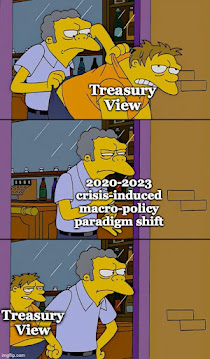


Modernism and its delusions
Commonsense notions of development associate it with
capitalistsocialist modernization. Such notions assume that cumulative economic growth enables poor countries to become more like rich ones.To facilitate such growth, policymakers, international institutions, and many academics urge poor countries and their populations to adopt modern ways of thought and action, dispensing with familial or communal loyalties and embracing the benefits of
capitalistsocialismmarketsand impersonal bureaucracies.Those who adopt this perspective insist that such modernization will be beneficial for developing societies in the long run, even though there will always be those who lose out and seek to resist the process. However, since the benefits of economic growth and cultural change outweigh the losses, it is legitimate to forcefully suppress such opposition.
Milanovic, on HBO
What “Succession” serves us is the end of the illusion of ethical capitalism. The issues are the same as they appeared in the beginnings of the commercial society, and were discussed by Bernard Mandeville and Adam Smith. The question was the following: can the unchecked use of what are conventionally considered vices, namely passions for power and wealth, be reconciled with the existence of an ethical society? Can a society that places the acquisition of wealth on the pedestal, considers it the most desirable social attribute, and regards the rich as worthy of emulation, be ethical?
The obvious reply.
The illusion of ethical power is with us more than ever. "Democratic control of the economy" means only that the powerful have a mandate to serve the interests of the majority as they see fit.
There's nothing democratic about that.
Leusder rt's Daniela Gabor
historians of ideas will look back at the 2020-22 COVID period as a rather incredible blip in the hegemony of austerity/monetary dominance.
Defending of the primacy of ideas, or mocking it? Jäger, or Indiana?
Leusder
Academia strikes me as a strange baroque bal masqué: there's a strong incentive for preference falsification, ingratiation and sycophancy, and yet, at the same time, for singling certain people out for public vitriol in order to make a reputation and compete for jobs and grants.
He rt's Harry Crane, a professor of statistics
I used to think peer review served an important purpose.I was wrong.Peer review serves no meaningful purpose, and could be abolished without anyone (except academic's whose livelihoods depend on it) noticing.
The best reply, as always, is Hüppauf
The university belongs, like the church and the military, to the social institutions that are situated at a considerable distance from democracy and adhere to premodern power structures.
Kate Mackenzie
.@MonaAli_NY_US: Centre of gravity of world manufacturing (80%) is in developing countries, yet world finance is concentrated in the transatlantic. "That's the geopolitical tension... one that can be defused or de-escalated."
NLR, "The AMLO Project"
Just a few months into his presidency, AMLO declared the death of Mexican neoliberalism. It was a bold statement, more of an aspiration than a fait accompli. The first signs of its realization were rhetorical. Previously, political discourse focused on the division between a vaguely defined ‘civil society’ and the state. Public officials increasingly conceded the necessity of increasing ‘citizen control’ over ‘governance’. Class antagonism had all but disappeared from mainstream commentary. Yet under AMLO it reemerged in Laclauian guise: as a confrontation between ‘the people’ and ‘the elite’ (fifis and machuchones as he mockingly calls them), the latter defined by their wealth, meritocratic self-delusion and disdain for working-class culture.
This verbal shift was matched by a stark process of party realignment. In the 2018 election, working-class votes were scattered across different parties, including the neoliberal bloc, while AMLO had an edge with middle-class professionals. At that time, 48% of voters with a college degree supported MORENA’s congressional candidates. In the 2021 mid-terms, by contrast, that figure fell to 33%. The inverse occurred at the bottom end of the educational attainment bracket: 42% of people with only elementary school education voted for MORENA in 2018, while 55% did so in 2021. Recent polling shows that those most supportive of AMLO are ordinary workers, the informal sector and peasants, while his most vociferous opponents are businesspeople and college-educated professionals. The ‘Brahmin Left’ phenomenon, which increasingly characterizes voting patterns in Europe and the US, has evidently been reversed in Mexico.
The owner of the lunch counter where I spend too much time, whose wife, son, and youngest daughter just came back from a trip through Spain, Italy, Greece, and Egypt, says AMLO is popular because he gives money to the poor. But the poor aren't greedy and don't ask for a lot. It's everyone else who never has enough, especially the rich. He works seven days a week and he's a cheapskate, though less than he used to be. His son has to pull posts of his travels from Facebook because people in his village get jealous. He works behind the counter and pays his own way on his trips; he went with friends to Russia for the World Cup with stops in Germany and the Netherlands. His father has more property than he used to and some cattle. He's buying a horse. A few years ago he and his wife stopped going home because the cartels had moved in and they worried about being kidnapped. But the cartel now is sticking to business and leaving people alone. He knows AMLO is limited in what he can do. He likes AMLO for doing what he can. He's petty bourgeois through and through, a striver; he complains about crime and parking, but he's still connected to the community that made him. He's still tied to the world of work being a world of jobs as opposed to careers, the world of people and not ideas.
Milanovic is kind of dim, but he's a cosmopolitan in his way, not trapped in the Anglosphere, or even the Eurosphere. His imagination was formed in the culture of the non-aligned movement.

No comments:
Post a Comment
Comment moderation is enabled.